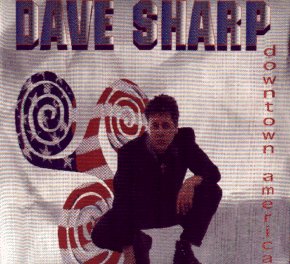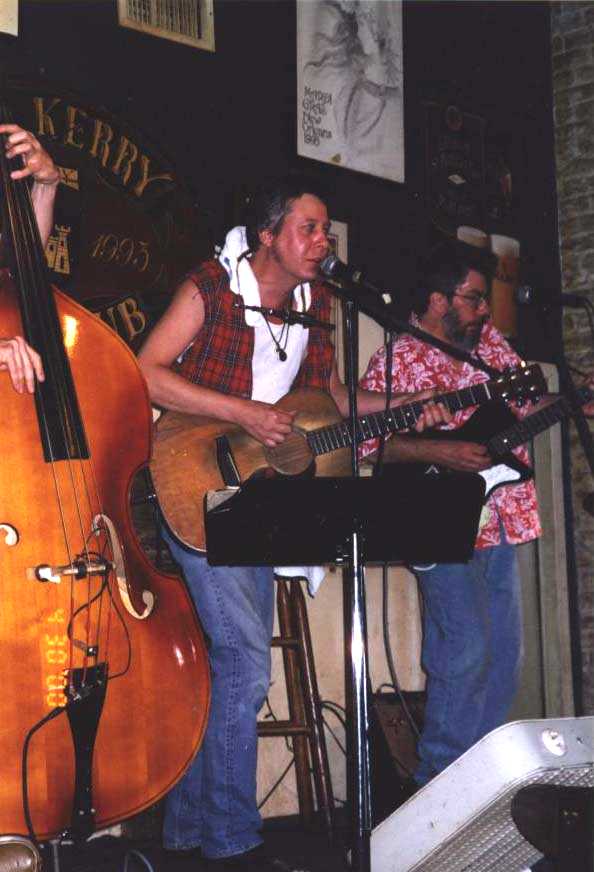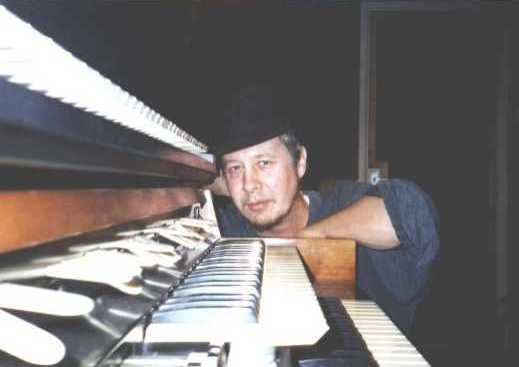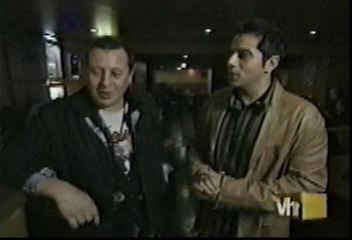www.davesharp.org interview with Dave Sharp 2004 (Part 1).
Page 3.
<<Back to Start
|
|
You hadn’t been in New Orleans for very long when you suddenly went on tour with Stiff Little Fingers. How did that come about?
|
|
Well, I couldn’t turn that down really. Jake had called me and said ''I’m stuck, I need your help, I need a guitar player''. Jake Burns gave The Alarm their first break - if it wasn’t for Stiff Little Fingers, there would be no Alarm.
If it hadn’t been for Jake deciding to play a couple of gigs to wind up the band and inviting us to be part of that, and then from the stage to say ''I’m done, but I want you to follow this bunch of Welsh idiots'', we’d have never had the opportunity to get out and do anything. I mean who knows what would have happened, but that was the break.
So when Jake called and said ''I need your help'', I was in no position to refuse.
|
|
Was it always only for one tour?
|
|
Well that was the basis that they asked me to do it. But to be quite honest with you -and I love Stiff Little Fingers - if you had said to me the year before that I was going to join Stiff Little Fingers, I would have thought you were crazy!
It was a great tour. I had never been in another band apart from The Alarm, I’d certainly never played heavy duty punk rock, pure unadulterated punk rock. I had come from a background of Free and Humble Pie you know? Obviously when punk happened, I got into it like everyone else who thought ''wow, here’s a new way of doing it'', but I had never been as totally involved first hand as a band like the Fingers.
So I thought yeah, it will be a great experience, and I’m glad to have been able to do it. To do it for Jake, but also, I got a lot out of it myself in terms of a learning experience.
As far as I knew, when the tour was over, that was it. But when I got back home to New Orleans, I got a call from Jake about three weeks later to ask if I would fly out to play a festival with them, but although I would have loved to have done it, I’d begun the process and wanted to continue. So I had to say no to Jake, but he was magnanimous enough to understand and respect what I was saying and where I was going. So they went ahead and did it as a three piece.
|
|
What was the first thing you felt you had to do when you got to New Orleans?
|
Well the first thing I had to do was to get out there and learn to exist without being in a band, and to really come to terms with that. So the first thing I had to do was to really focus on just being a singer / songwriter / solo artist / performer. And there’s some pretty hot competition down there you know? So I launched myself into that, and it took me about two or three years to really feel like I had got to grips with that. In the meantime, I had another ''band'' album to make, which was Downtown America.  But there was a whole mess-up with the release of Downtown America. It came out two years too late. It was finished in 1995, and was recorded in two halves. We thought we had finished it in ’94, but the record company was still getting itself together, and it was going through some business problems that were going to take about a year to resolve. And I listened back to what we had done at that point, and I thought ''It’s not finished''. So I called the company and told them that I had about four or five new songs that I had to add to make this a viable and complete piece of work, and I managed to arm twist them into letting us go back in to the studio. So we went back in and recorded the extra music. It then took them a further 8 months for them to finally get the damn thing out. So when it was released, it had been like four years from beginning to end, which was totally ridiculous, because it meant that the whole thing was so off target musically and politically, that although working with Bob Johnston had given me the foresight to record a body of work that hopefully would stand the test of time, by the time it came to be launched it was unlaunchable. Although I was really happy with the end result, no way was it going to take the industry by storm, it was going to be a very hard sell. So when it finally did come out, it was no surprise to me that it did what it did, and that was ship platinum and sell plywood. So although it was a massive learning experience, and I was able to bring the whole kind of folk-thing to a logical point, I knew I had to be thinking more long term. But it stands up as a great piece of work, and I’m very proud of it - it could have done with a few edits here and there, but I listen back to some of the songs, and they still mean what they mean, you know?
|

|
|
So at what point did you discover The Kerry?
|
Oh that was totally by accident. I’d been doing some open mikes at The Howlin Wolf, at The Neutral Ground and Checkpoint Charlie’s. I’d seen an Irish accordion player at Checkpoint Charlie’s so I went up an introduced myself. It was a fellow called Eddie Doyle, a real fine musician, and we hit it off almost instantly. I started hanging round with Eddie for a while, talking about what we were doing musically. Then about six months later, I bumped into him again and he said ''we’re really fed up with the mentality of some of the club owners here in New Orleans, so we’re going to start a club, do you want to be involved?''. I said ''Yeah I’d love to''. There were a few things going on which were a bit inappropriate in terms of exploitation of artists. They were expecting you to play for like a dollar a night, which is a bit ridiculous for five hours banging & thrashing. So Eddie said ''We want to start this club and we’re going to have a new idea about it. It’s going to be all about the music, it’s not going to be commercial, obviously it’s got to pay it’s way and be a viable business, but what we’re into is making it a great environment for musicians for people who just want to have a quiet drink. We want it to be a really cool place to be''. So I said ''I’m in'', I had no hesitation.  Bit by bit it got built and Eddie finally gave me a call and said let’s put the band together, we want it to be the house band, although there were a couple of other house bands and regular artists lined up as well. I was doing some open mikes with a really good buddy of mine called Mike Carraciola, so I called Mike up and said let’s put a band together. We hunted round for a while and finally found an upright player. I’d got to know Frank Saucier by this point, so it ended up being me, Carraciola, Frank Saucier, this upright player from New Zealand and Eddie Doyle on accordion. So we became the house band at the Kerry for about a year, this would be ’93-’94. So now of course I’m a solo artist, I’m trying to launch a national album and I’m the leader of the house band at The Kerry Irish Pub - I’m in three places at once.
|
|
Can you tell us a bit about how the Evenfield studio came into being, and the people that were involved?
|
|
Along the way I’d met Vegas and Heritage (a.k.a. Paul Licciardi) and they had a thing called the Dixie Minstrels who I’d seen at an open mike night and who I thought were nothing short of astounding, they blew my mind. Vegas blew out of town for a couple of years, but right after Downtown America came out, he came back. We met up and I was moaning & whinging about the record company and what a cock up Downtown America had been, he was similarly frustrated and talking about doing something new. So I said ''Listen, how about if we got a studio together''. We agreed that that was what we needed to do, we wanted to be in a place where we could write and record without any pressure, without being on anyone else’s time.
So we had a meeting - myself, Vegas, Heritage and Frank, who had had a studio with the Saucier brothers but which was a kind of studio in a house affair. Vegas and I said there was no way we were going to do a studio in a house, we were going to put together a recording studio to the same kind of specs that we’d been used to (for Downtown America and Hard Travellin’ etc). Frank was in, two thumbs up and the four of us made a pact to do it.
It took us about two years to put the thing together, find the space and gather all the equipment. We pretty much had to make all the equipment ourselves - aside from the standard bits of kit which you need for a studio, we constructed almost all of the rest ourselves. It took us a bit of time to do it, but we finally got up and running around late 97 early 98, which I think was when we first turned the tapes on. We had a mighty mighty barbeque that weekend, think it went on for about four days.
|
|
Is the studio still there?
|
 We broke it down a little while after I left for England. It was pretty much just the four of us and funded by us. The rent on the space alone was just astronomical, upwards of $800 a month which was fine when there were four of us, but it wasn’t a commercial venture and we weren’t really interested in making it a commercial venture. So it stayed alive for about a year after I left, but eventually we broke it down and put all the equipment into storage. We gave Saucier a bunch of equipment so he and Heritage could set up a satellite and keep rocking. Vegas split New Orleans again. Between about 1998 & 2001 was when it was really happening. There was a massive amount of creativity going on, there were four different types of music going on, four different artists constantly round the clock recording in the place for about four years, plus we were having other bands in maybe about once a month or so. I was able to bring everything to bear in what I’d learnt in my time in New Orleans and where I was going and was finally able to bring it all into focus. That was when we knew we were onto something for what is now Soul Company.
|

|
|
Moving up to date again and VH-1 Bands Reunited, The Scala. Let’s start at the start - on the program you’re first seen standing in a bar in Manchester called Big Hands when a camera crew bursts in. Tell us from your side of the camera.
|
I got this call from Charlie McIntosh one afternoon. He calls me up out of the blue and he’s very excited. He says ‘‘I’ve just had this call from a promoter in London who’s starting a new acoustic club and has heard about you. They really want you to be there on the opening night to perform’‘. I was very flattered, felt very honoured. I think I’d just done the 12 Bar club in London a couple of weeks before, so I though OK, fair enough, I’m sure there’s a zillion artists in a better position to launch an opening night, considering the audience numbers I was getting at the time (laughs) - Where were the fans, where we you hiding when the Sharp broke? - but I said ‘‘Yeah of course I’d be very interested, what’s the story’‘. The story went that they were just starting out and looking for a bit of help, wanted me to perform, but they also wanted advice. He said ‘‘They understand you’ve done a lot of things, got a lot of experience of this sort of thing’‘. He gave me this number and told me to give them a call. I said I’m interested in doing a gig (was a bit short of dough at the time), so I called and it was some girl, I forget her name, and she says ‘‘We’re starting this club, blah, blah blah, we’re just starting out, not really sure what we’re doing…’‘ The she said ‘‘We’re going to be up in Manchester in a couple of weeks, is there any chance we could meet up and have a chat?’‘. I said ‘‘If I can be of any help in anyway, help to keep music live’‘, knowing how risky hard it is to put something together, ‘‘sure I’ll meet you’‘. We arranged to meet at The Big Hands and I’m standing there waiting for this girl to show up, and it’s getting later and later and I’m thinking I’ve been blown out. I’m minding my own business, then all of a sudden out of the window there’s about a dozen people with lights and cameras and everything and I’m thinking ‘‘what’s going on out there, must be shooting something’‘. But then they start walking into the bar. I think ‘‘cripes, Sting must be behind me or David Bowie hanging out in the back room’‘. So I’m trying to get out of the way, you know it’s television, you don’t want to get in the way too much with all the wires and stuff.  And all of a sudden this guy is in my face with a microphone – ‘‘Are you Dave Sharp? Did you used to be in The Alarm?’‘ He says ‘‘We’re from VH-1 were trying to put The Alarm back together, are you interested’‘. And you’ll have seen the rest! Although I think they managed to loose my initial response on the cutting room floor, it wasn’t printable! VH-1 have always been massive supporters of The Alarm and they’ve supported my solo efforts for years and in my opinion VH-1 have always been a conscientious bunch of folks, have always seemed to have music at the front of their agenda. So at the end of the day I was very very happy to do whatever I could. It was really kind of interesting because it was neutral, it wasn’t like I got a call from Mike, or Eddie or Nigel, saying look we’ve had this offer to do this for MTV, or Music X, Music Y. There’s been so much water under the bridge, so many offers of trying to get back together again; it’s always felt not quite right. But from where I was standing this seemed to be neutral, it wasn’t anything that was organised by anybody that was anything to do with The Alarm. I wasn’t going to stand in the way if somebody thought there was a shot of us playing together because I’ve always wanted to play with the fellows. I said ‘‘If you think you can do it, go ahead, I’m in.’‘
|
|
At that stage, did they tell you who they’d already approached?
|
|
They said ‘‘Well now you’re in, we can tell you that a couple of the band members have already agreed, but we’re not allowed to tell you who’‘. I asked ‘‘Have all the members agreed, am I the last one?’‘. I wasn’t, but there was an off the record discussion so I knew what was going to happen next and that confirmed in my mind that it was a neutral thing. But by that point I’d already decided that if there was a shot of getting together with the fellows and doing something then it would be really really cool.
|
|
So did you speak to any of the others?
|
|
No, we were under contract. I was under contract not to instigate any calls to any of the other band members and I can quite categorically state that I did not instigate any calls to any of the other members (that I can recollect).
|
|
It came together and you ended up in London and the program shows you first meeting the others at the venue. How nervous were you before that first meeting?
|
|
I’d got a reasonable night’s sleep the night before and up to that point I’d been totally relaxed about everything because I knew it was a neutral thing and was very comfortable with the whole affair. But the first thing they did to me that morning was get me in front of a camera, before I’d even had breakfast or anything. So I was a little bit edgy for that particular interview but I knew I wasn’t going to be nervous about meeting the guys. I was really looking forward to it, was in no way apprehensive.
What was going through my mind at that time was that I’d just figured out who else was doing the series and I was beginning to wonder if the band was being set up for some kind of piss-take. As I was a little bit shaky that morning I just wasn’t sure. I had every confidence that it wasn’t, but a really nagging doubt that this might be a total set up. Once I’d had a coffee and a donut I was fine.
|
|


